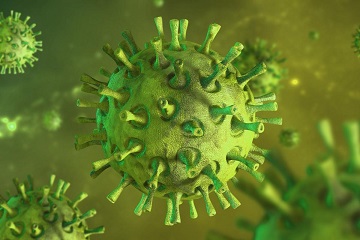Indonesian Physicians Report Case Study Showing SARS-CoV-2 Infection Escalating Penile Necrosis In Leprosy Patient!
Source: Thailand Medical - Leprosy -SARS-CoV-2 Feb 23, 2022 3 years, 11 months, 2 weeks, 2 days, 14 minutes ago
Indonesian physicians from the Universitas Syiah Kuala and the Dr. Hasan Sadikin General Hospital at Universitas Padjajaran have presented a case study involving a patient with leprosy contracting SARS-CoV-2 in which it was found that the co-infection escalated the necrosis of the glans of the penis.

Several serious extrapulmonary manifestations due to SARS-CoV-2 infection have also been reported and associated with hypercoagulability thrombotic vasculopathy. In addition, cases of Mycobacterium-leprae infection have also been known associated with blood coagulation abnormality.
The Indonesian physicians reported a 56-year-old male with coronavirus disease-19 (COVID-19) with concomitant leprosy infection with manifestation of glans penile necrosis, presented to the emergency department with acute penile pain. This case is unique because no occlusion blood flow to the penile was observed in the radiographic imaging.
The physicians described the potential pathophysiology in this case through a literature review.
The patient received treatment according to the COVID-19 protocol and was given low molecular weight heparin (LMWH) therapy for 4 days. During the follow up, the clinical and functional condition of the penis showed significant improvement.
The Indonesian physicians concluded that microthrombus involvement, platelet abnormalities and impaired hemostasis due to SARS-CoV-2 and leprosy co-infection are the hypothesis in this case report.
The case report was published on a preprint server and is pending peer review.
https://f1000research.com/articles/11-142
Recently, other serious clinical manifestations associated with genitalia condition were reported in patients with SARS-CoV-2 infection with penile ischemia.
https://pubmed.ncbi.nlm.nih.gov/33866610/
In patients infected by SARS-CoV-2, penile priapism has also been reported.
https://www.sciencedirect.com/science/article/pii/S0735675720305143
https://pubmed.ncbi.nlm.nih.gov/33868634/
Some researchers have speculated that these conditions related to COVID-19 may be due to severe hypercoagulability and thrombotic tendency observed in patients with COVID-19.
https://pubmed.ncbi.nlm.nih.gov/32557889/
Typically, penile necrosis is linked to thrombotic events and calcium deposits in dialysis patients.
https://pubmed.ncbi.nlm.nih.gov/1878296/
A study in Japan described fifteen patients with penile necrosis due to calciphylaxis and a long history of diabetes.
https://pubmed.ncbi.nlm.nih.gov/17603238/
In this condition, it is clearly understood that diabetic vasculopathy and calcium deposits can become a thrombus which causes impaired blood flow to penis.
Corresponding author, Dr Jufriady Ismy from the Division of Urology, Department of S
urgery at Universitas Syiah Kuala told
Thailand Medical News, “The patient in this case report had no comorbid precipitating thrombus vasculopathy. Although the patient was an active smoker, it still cannot be concluded that this is the cause of penile necrosis. Uniquely, the CT angiography investigation of our patient did not reveal any occlusion or thrombus.”
The Indonesia physicians on the basis of the above finding, hypothesized that the patient's penis glans necrosis was caused by COVID-19 and leprosy co-infection.
Many past studies have published the role of microvascular thrombus in SARS-CoV-2 infection.
https://pubmed.ncbi.nlm.nih.gov/32838472/
https://pubmed.ncbi.nlm.nih.gov/33604359/
https://pubmed.ncbi.nlm.nih.gov/32586214/
https://www.nature.com/articles/s41591-020-0968-3
There is a definite link between inflammation, hypercoagulation, and thrombosis, according to previous research. Part of this interaction is likely mediated by a cytokine storm, which increases the risk of developing disseminated intravascular coagulopathy.
https://onlinelibrary.wiley.com/doi/10.1111/ijlh.12830
The stimulation of coagulation pathways throughout the body by mediators produced during a cytokine storm can result in a prothrombotic condition marked by the formation of microthrombi, diffuse capillary blockage, tissue ischemia, and organ damage. This pathogenesis indicates the possible tendency for physiopathology of glans penile necrosis secondary to SARS-CoV-2 infection.
It should noted that similar to SARS-CoV-2 infection, leprosy has long been known to trigger hemostasis disorders due to platelet abnormalities, blood coagulation, and fibrinolysis.
https://pubmed.ncbi.nlm.nih.gov/29565968/
Several studies have previously reported that patients with tuberculoid leprosy who develop erythema nodosum leprosum (ENL) had a longer activated partial thromboplastin time (aPTT) with elevated fibrinogen and platelet activation.
https://pubmed.ncbi.nlm.nih.gov/515802/
https://pubmed.ncbi.nlm.nih.gov/1241689/
https://pubmed.ncbi.nlm.nih.gov/12175102/
One review of related studies has described thrombophlebitis and pulmonary embolism in leprosy patients who develop ENL.
https://pubmed.ncbi.nlm.nih.gov/8464323/
Another study also found that leprosy disease was associated with coronary thrombosis and cerebral vascular accidents.
https://pubmed.ncbi.nlm.nih.gov/13742762/
https://opac.perpusnas.go.id/DetailOpac.aspx?id=1141187
These research findings indicate that the severity of leprosy potentially leads to occlusion of blood flow which eventually causes organ damage.
The study team commented, “We assume that patients co-infected with SARS-CoV-2 and leprosy have a greater risk of complications, especially hemostasis disorders and thrombus vasculopathy, as in our patient who showed elevated of D-Dimer and fibrinogen levels. This case report and literature review provide preliminary evidence of the association between SARS-CoV-2 and leprosy infection in glans penile necrosis; however, further studies are warranted.”
The study findings also highlight precautions to be considered in managing glans penile necrosis in patients with COVID-19 infection. As previously described, penile necrosis can occur as a result of a vasculopathy thrombus. On the other hand, COVID-19 and leprosy infection can also induce coagulopathy and microvascular thrombus. Therefore, choosing anticoagulant therapy than immediate aggressive amputation of the organ is still a viable option. Administering anti-thrombus therapy is a less-intrusive treatment approach that physicians can consider, which in this case gave a good result in the patient concerned.
For more about
Leprosy and SARS-CoV-2, keep on logging to Thailand Medical News.
